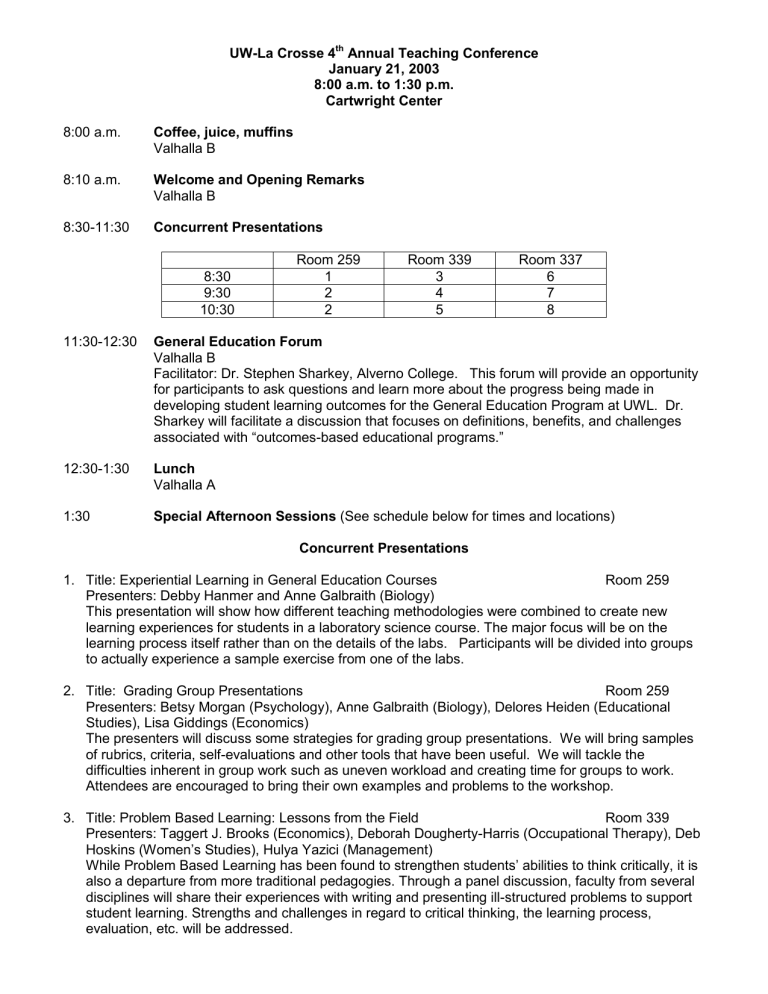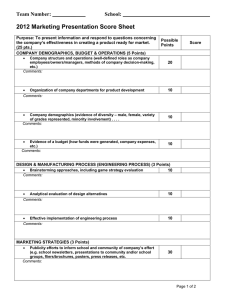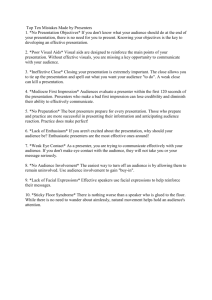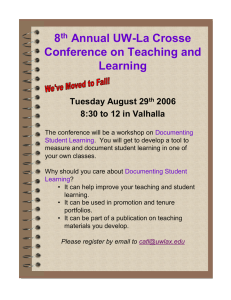UW-La Crosse 4 Annual Teaching Conference January 21, 2003

Coffee, juice, muffins
Valhalla B
UW-La Crosse 4 th
Annual Teaching Conference
January 21, 2003
8:00 a.m. to 1:30 p.m.
Cartwright Center
8:00 a.m.
8:10 a.m. Welcome and Opening Remarks
Valhalla B
8:30-11:30 Concurrent Presentations
8:30
9:30
10:30
Room 259
1
2
2
Room 339
3
4
5
Room 337
6
7
8
11:30-12:30 General Education Forum
Valhalla B
Facilitator: Dr. Stephen Sharkey, Alverno College. This forum will provide an opportunity for participants to ask questions and learn more about the progress being made in developing student learning outcomes for the General Education Program at UWL. Dr.
Sharkey will facilitate a discussion that focuses on definitions, benefits, and challenges associated with “outcomes-based educational programs.”
12:30-1:30 Lunch
1:30
Valhalla A
Special Afternoon Sessions (See schedule below for times and locations)
Concurrent Presentations
1. Title: Experiential Learning in General Education Courses Room 259
Presenters: Debby Hanmer and Anne Galbraith (Biology)
This presentation will show how different teaching methodologies were combined to create new learning experiences for students in a laboratory science course. The major focus will be on the learning process itself rather than on the details of the labs. Participants will be divided into groups to actually experience a sample exercise from one of the labs.
2. Title: Grading Group Presentations Room 259
Presenters: Betsy Morgan (Psychology), Anne Galbraith (Biology), Delores Heiden (Educational
Studies), Lisa Giddings (Economics)
The presenters will discuss some strategies for grading group presentations. We will bring samples of rubrics, criteria, self-evaluations and other tools that have been useful. We will tackle the difficulties inherent in group work such as uneven workload and creating time for groups to work.
Attendees are encouraged to bring their own examples and problems to the workshop.
3. Title: Problem Based Learning: Lessons from the Field Room 339
Presenters: Taggert J. Brooks (Economics), Deborah Dougherty-Harris (Occupational Therapy), Deb
Hoskins (Women’s Studies), Hulya Yazici (Management)
While Problem Based Learning has been found to strengthen students’ abilities to think critically, it is also a departure from more traditional pedagogies. Through a panel discussion, faculty from several disciplines will share their experiences with writing and presenting ill-structured problems to support student learning. Strengths and challenges in regard to critical thinking, the learning process, evaluation, etc. will be addressed.
4. Title: Teaching Writing as Inquiry
Presenters: Terry Beck, Virginia Crank, Bryan Kopp, Haixia Lan (English)
Room 339
This panel challenges two common misconceptions about writing: first that thinking is something other than writing and second that thinking occurs only before one puts the pen to the page.
Panelists will share teaching strategies that encourage students to conduct inquiries through thinking and writing at the same time.
5. Title: Integrating Information Literacy Skills and Concepts into General Education Courses: Two
Examples Room 339
Presenters: Suzanne Anglehart and Bonnie Bratina (Microbiology), Susan Crutchfield (English),
Cristine Prucha (Library), Hulya Yazici (Management)
The Faculty Senate Library Committee recommends integrating information literacy instruction into the general education curriculum. This panel presents two examples, one in the sciences and one in the humanities, in which students were better able to complete classroom objectives due to improved information literacy capabilities.
6. Title: The First Year Experience at UW-L According to First Year Students Room 337
Presenters: Bill Cerbin (Provost’s Office), Barbara Rusterholz (Modern Languages), Trish Ardovino
(Recreation), Charles Martin-Stanley (CLS), Nick Nicklaus (Residence Life), Becky Ledocq
(Mathematics), Akorlie Nyatepe-Coo (Institutional Research), Barbara Gibson (Exercise & Sport
Science), Glenn Brice (Biology), Charlene Holler (Counseling & Testing)
The National Survey of Student Engagement (NSSE) assesses how students spend their time in curricular and co-curricular activities, what kinds of academic work they engage in, their opinions of different aspects of the educational environment, and more. This session will examine the NSSE results of nearly 4,000 UW-L students, and involve the audience in a discussion of implications for improving students’ educational experiences and the overall educational climate at UW-La Crosse.
7. Title: Building Community with Blackboard
Presenter: Janis Hanson (Modern Languages and English as a Second Language)
Room 337
The presenter will describe approaches to building a learning community through Blackboard, an online course management system. We will look at the challenges and rewards of using this tool to promote student interaction, accountability and enthusiasm for learning.
8. Title: Taking (Some of) the Pain out of Evaluation of Student Writing Room 337
Presenters Terry Beck and Brian Kopp (English)
This session is for faculty who would like to reduce the amount of time they spend grading papers
— without comprising the quality and effectiveness of feedback. Topics to be discussed (and practiced as time allows) include designing writing assignments, responding to papers, and assessing student learning.
Special Afternoon Sessions
Problem-Based and Case-Based Learning: REVIEW Session Room 326
1:30-3:30
This special session is open to all. Learn more about the joys and challenges associated with using
Problem-Based and Case-Based approaches to teaching and learning by hearing from faculty who have developed or used these approaches. Presenters will include faculty who participated in the summer
2002 PBL and CBL workshops that are particularly interested in sharing their experiences and receiving feedback.
GENERAL EDUCATION SPECIAL SESSION Room 259
1:30-4:00
Learn more about Student Learning Outcomes and the General Education Program. You are welcome to attend a special workshop of the General Education committee in which Dr. Stephen Sharkey will provide feedback on and suggest next steps for finalization and implementation of the General Education learning outcomes.


